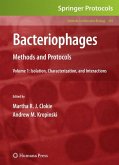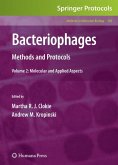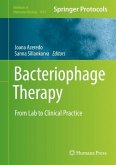This book expands on the previous volumes with new chapters focusing on functional characterization of phage and their proteins, and on the development of phage therapy by outlining novel models. The chapters in this book cover molecular topics such as PhageFISH for monitoring phage infections at single cell level; the analysis of phage-host protein-protein interactions using Strep-tag® II purifications; and also application driven chapters including 'duckweed (Lemna minor) and alfalfa (Medicago sativa) as bacterial infection model systems'. Written in the highly successful Methods in Molecular Biology series format, chapters include introductions to their respective topics, lists of the necessary materials and reagents, step-by-step, readily reproducible laboratory protocols, and tips on troubleshooting and avoiding known pitfalls.
Innovative and thorough, Bacteriophages: Methods and Protocols, Volume IV is a valuable resource for both establishedand novice phage scientists.
Innovative and thorough, Bacteriophages: Methods and Protocols, Volume IV is a valuable resource for both establishedand novice phage scientists.
"The book describes the functional elucidation of bacteriophages in the current era, as well as the drive towards application-driven research. ... this is a very interesting resource for protocols regarding phages and their use for therapy. I am going to include it in my reference material for my own students working on phages in relation to the gut microbiota." (Koen Venema, Beneficial Microbes, Vol. 10 (3), 2019)








